Report on Staff Development and Leadership in the Hospitality Sector
VerifiedAdded on 2022/12/23
|11
|3319
|52
Report
AI Summary
This report examines staff development and engagement strategies within the Hilton Hotel, focusing on performance management, team development, and leadership approaches. It analyzes the systematic approach to performance management as a crucial element of human resource development, detailing the stages from goal setting to feedback. The report further explores the stages of team development, based on Tuckman's model, to create high-performance teams, emphasizing the importance of each stage from forming to adjourning. Additionally, it investigates leadership in the 21st century, highlighting the shift from autocratic to participative leadership styles to enhance employee engagement and innovation. The report also addresses conflict management skills and strategies essential for leadership development within the hospitality sector, concluding with insights into the evolving dynamics of staff development and leadership.
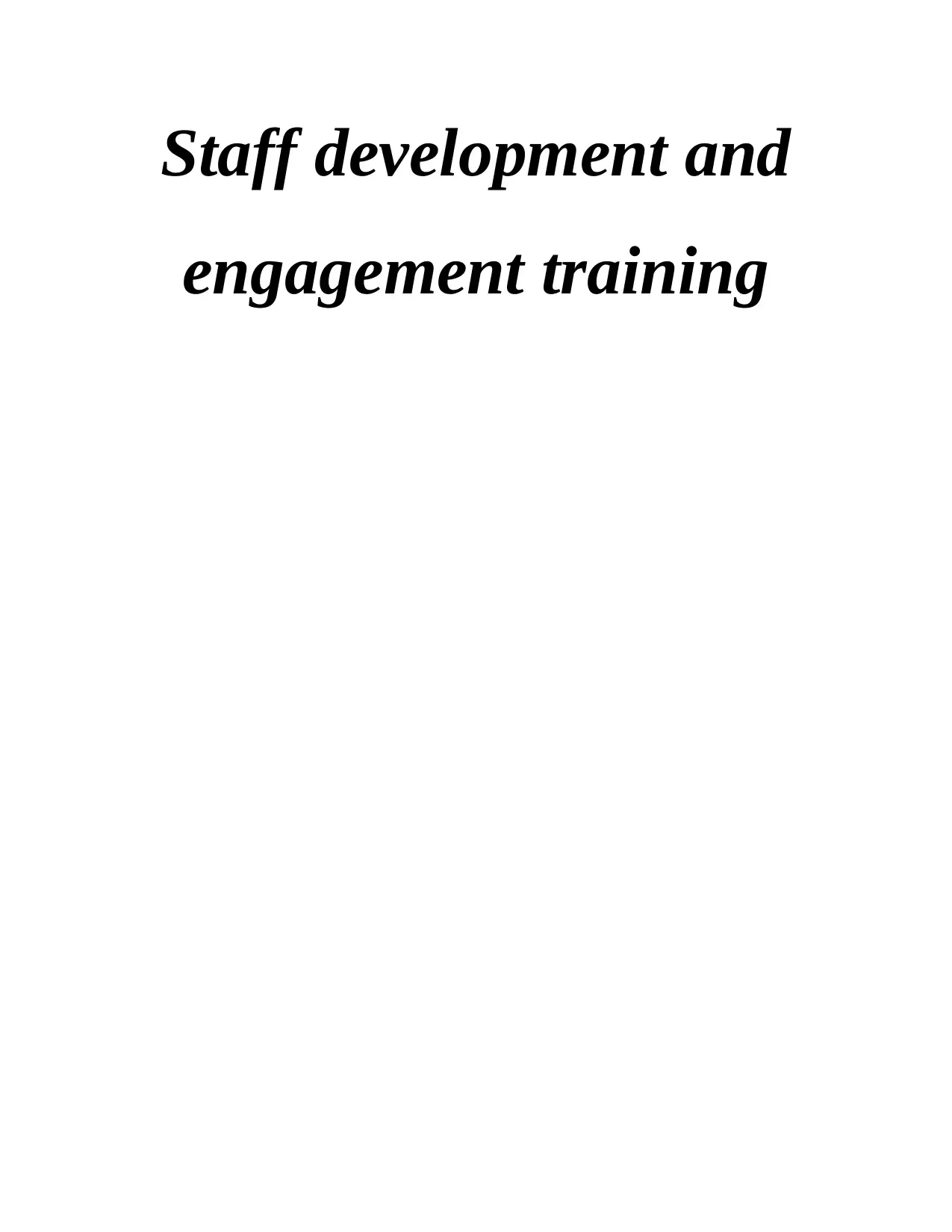
Staff development and
engagement training
engagement training
Paraphrase This Document
Need a fresh take? Get an instant paraphrase of this document with our AI Paraphraser
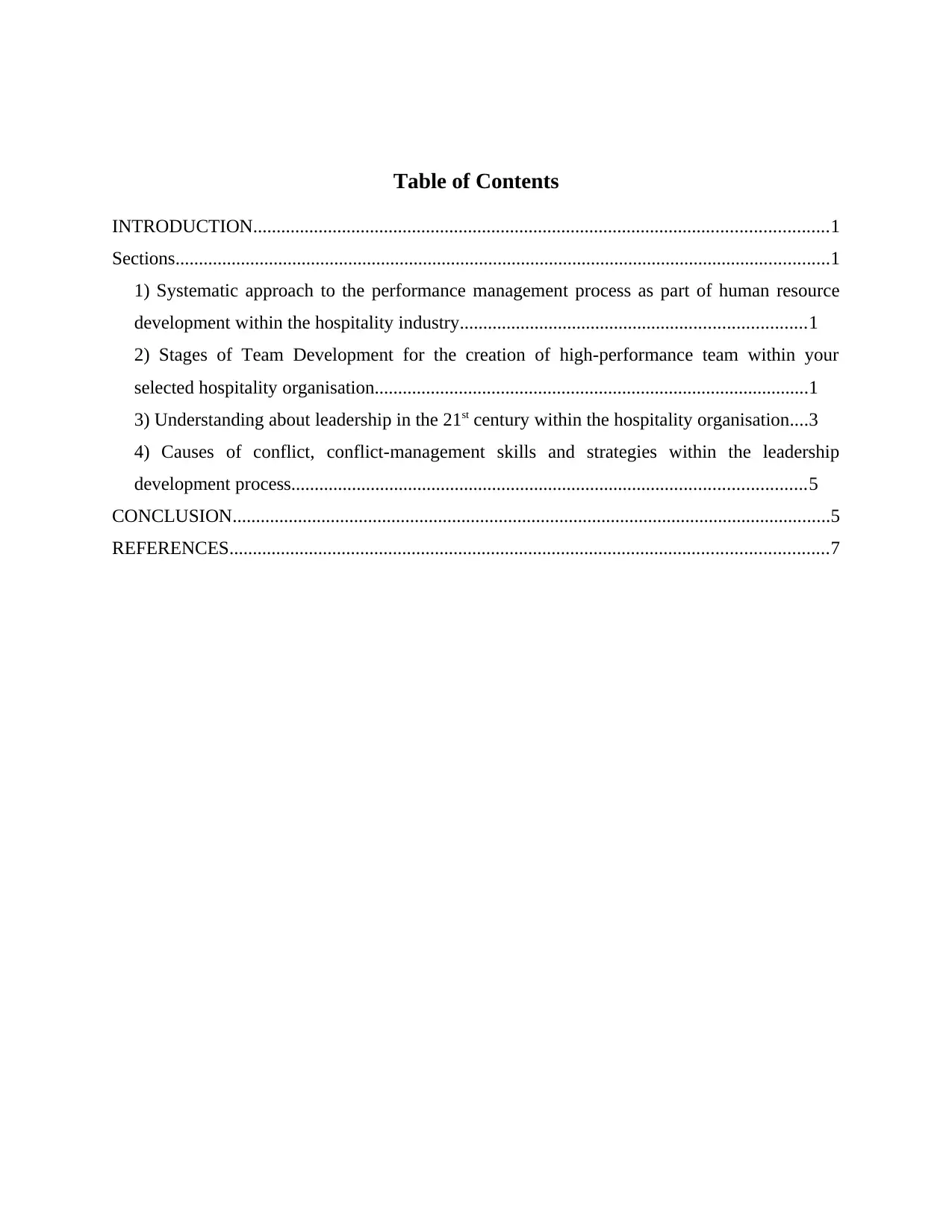
Table of Contents
INTRODUCTION...........................................................................................................................1
Sections............................................................................................................................................1
1) Systematic approach to the performance management process as part of human resource
development within the hospitality industry..........................................................................1
2) Stages of Team Development for the creation of high-performance team within your
selected hospitality organisation.............................................................................................1
3) Understanding about leadership in the 21st century within the hospitality organisation....3
4) Causes of conflict, conflict-management skills and strategies within the leadership
development process..............................................................................................................5
CONCLUSION................................................................................................................................5
REFERENCES................................................................................................................................7
INTRODUCTION...........................................................................................................................1
Sections............................................................................................................................................1
1) Systematic approach to the performance management process as part of human resource
development within the hospitality industry..........................................................................1
2) Stages of Team Development for the creation of high-performance team within your
selected hospitality organisation.............................................................................................1
3) Understanding about leadership in the 21st century within the hospitality organisation....3
4) Causes of conflict, conflict-management skills and strategies within the leadership
development process..............................................................................................................5
CONCLUSION................................................................................................................................5
REFERENCES................................................................................................................................7
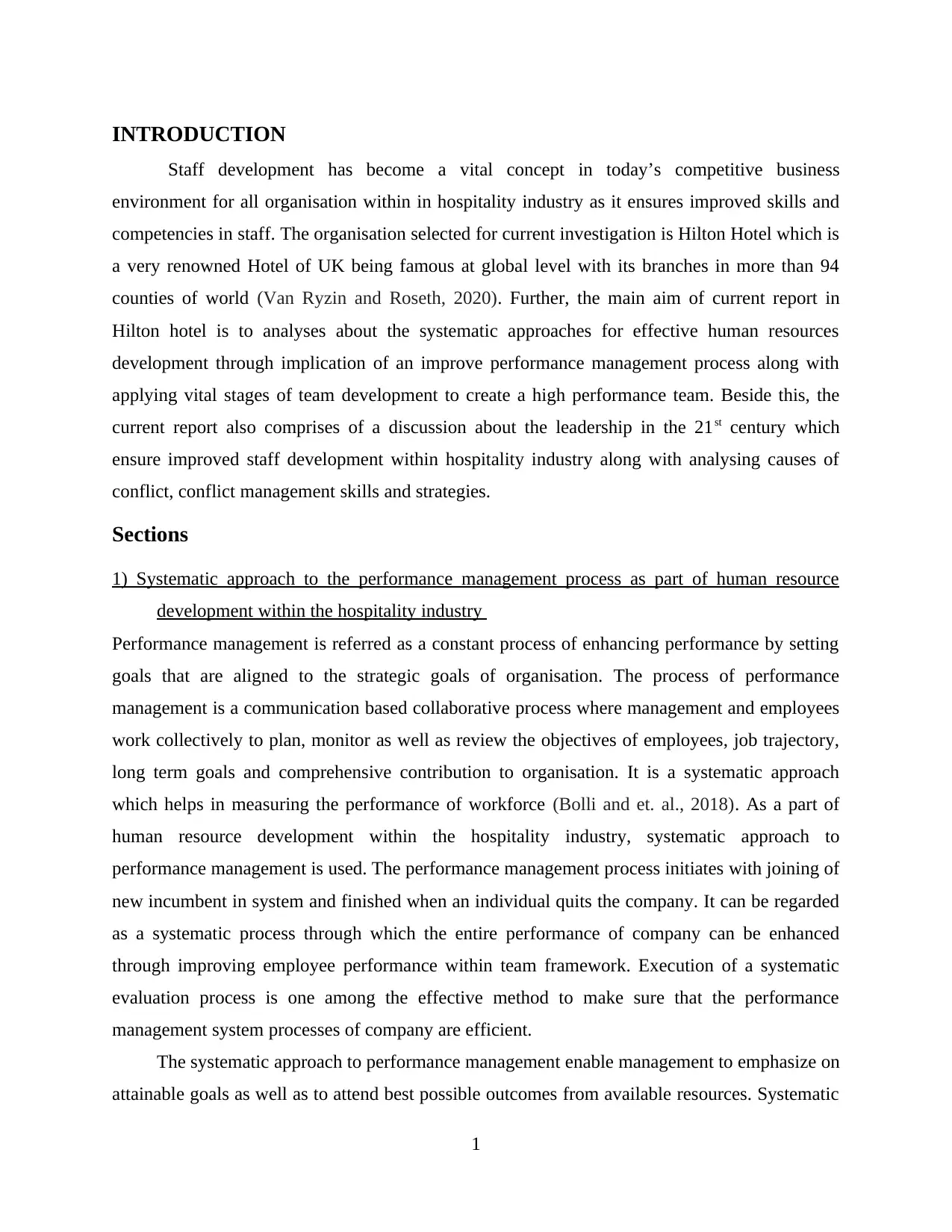
INTRODUCTION
Staff development has become a vital concept in today’s competitive business
environment for all organisation within in hospitality industry as it ensures improved skills and
competencies in staff. The organisation selected for current investigation is Hilton Hotel which is
a very renowned Hotel of UK being famous at global level with its branches in more than 94
counties of world (Van Ryzin and Roseth, 2020). Further, the main aim of current report in
Hilton hotel is to analyses about the systematic approaches for effective human resources
development through implication of an improve performance management process along with
applying vital stages of team development to create a high performance team. Beside this, the
current report also comprises of a discussion about the leadership in the 21st century which
ensure improved staff development within hospitality industry along with analysing causes of
conflict, conflict management skills and strategies.
Sections
1) Systematic approach to the performance management process as part of human resource
development within the hospitality industry
Performance management is referred as a constant process of enhancing performance by setting
goals that are aligned to the strategic goals of organisation. The process of performance
management is a communication based collaborative process where management and employees
work collectively to plan, monitor as well as review the objectives of employees, job trajectory,
long term goals and comprehensive contribution to organisation. It is a systematic approach
which helps in measuring the performance of workforce (Bolli and et. al., 2018). As a part of
human resource development within the hospitality industry, systematic approach to
performance management is used. The performance management process initiates with joining of
new incumbent in system and finished when an individual quits the company. It can be regarded
as a systematic process through which the entire performance of company can be enhanced
through improving employee performance within team framework. Execution of a systematic
evaluation process is one among the effective method to make sure that the performance
management system processes of company are efficient.
The systematic approach to performance management enable management to emphasize on
attainable goals as well as to attend best possible outcomes from available resources. Systematic
1
Staff development has become a vital concept in today’s competitive business
environment for all organisation within in hospitality industry as it ensures improved skills and
competencies in staff. The organisation selected for current investigation is Hilton Hotel which is
a very renowned Hotel of UK being famous at global level with its branches in more than 94
counties of world (Van Ryzin and Roseth, 2020). Further, the main aim of current report in
Hilton hotel is to analyses about the systematic approaches for effective human resources
development through implication of an improve performance management process along with
applying vital stages of team development to create a high performance team. Beside this, the
current report also comprises of a discussion about the leadership in the 21st century which
ensure improved staff development within hospitality industry along with analysing causes of
conflict, conflict management skills and strategies.
Sections
1) Systematic approach to the performance management process as part of human resource
development within the hospitality industry
Performance management is referred as a constant process of enhancing performance by setting
goals that are aligned to the strategic goals of organisation. The process of performance
management is a communication based collaborative process where management and employees
work collectively to plan, monitor as well as review the objectives of employees, job trajectory,
long term goals and comprehensive contribution to organisation. It is a systematic approach
which helps in measuring the performance of workforce (Bolli and et. al., 2018). As a part of
human resource development within the hospitality industry, systematic approach to
performance management is used. The performance management process initiates with joining of
new incumbent in system and finished when an individual quits the company. It can be regarded
as a systematic process through which the entire performance of company can be enhanced
through improving employee performance within team framework. Execution of a systematic
evaluation process is one among the effective method to make sure that the performance
management system processes of company are efficient.
The systematic approach to performance management enable management to emphasize on
attainable goals as well as to attend best possible outcomes from available resources. Systematic
1
⊘ This is a preview!⊘
Do you want full access?
Subscribe today to unlock all pages.

Trusted by 1+ million students worldwide
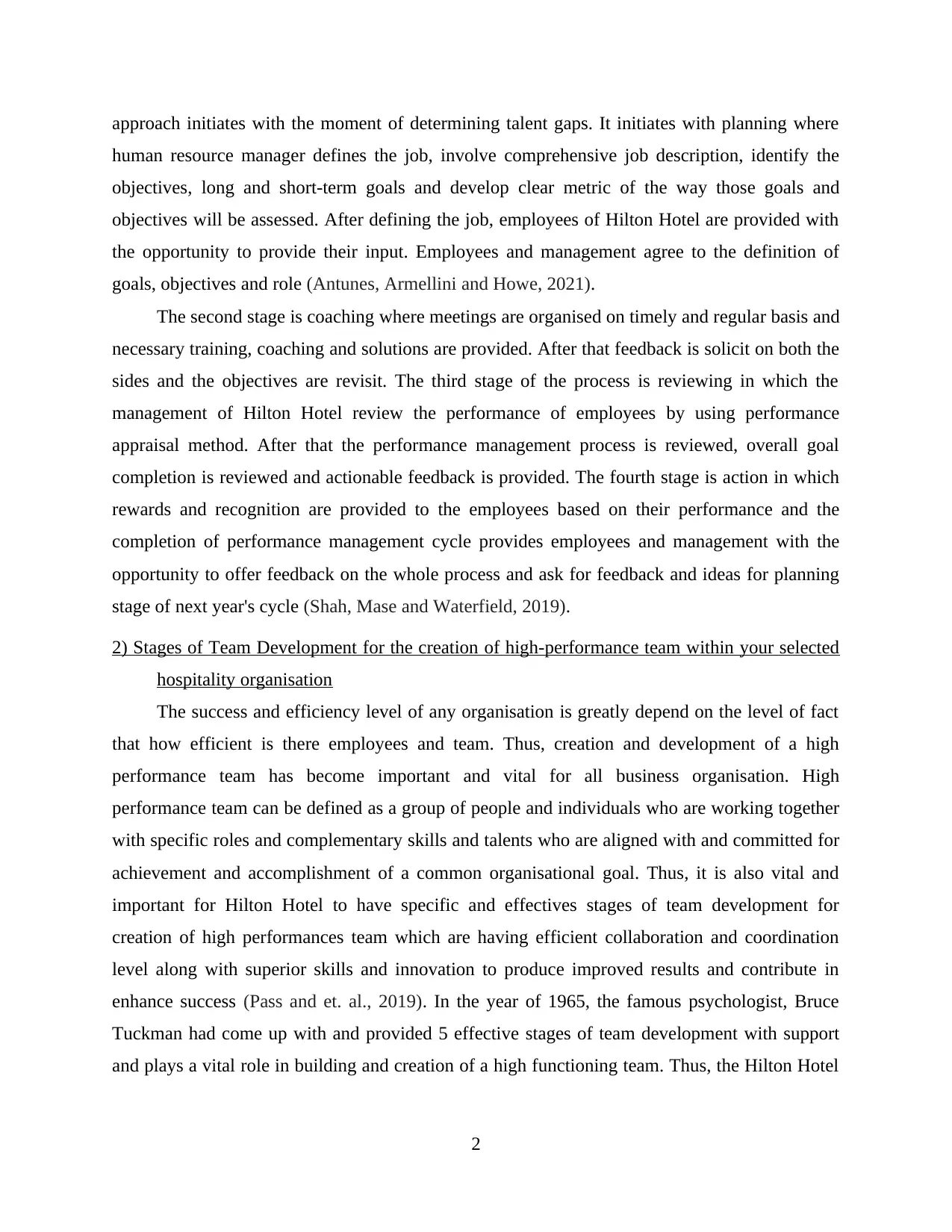
approach initiates with the moment of determining talent gaps. It initiates with planning where
human resource manager defines the job, involve comprehensive job description, identify the
objectives, long and short-term goals and develop clear metric of the way those goals and
objectives will be assessed. After defining the job, employees of Hilton Hotel are provided with
the opportunity to provide their input. Employees and management agree to the definition of
goals, objectives and role (Antunes, Armellini and Howe, 2021).
The second stage is coaching where meetings are organised on timely and regular basis and
necessary training, coaching and solutions are provided. After that feedback is solicit on both the
sides and the objectives are revisit. The third stage of the process is reviewing in which the
management of Hilton Hotel review the performance of employees by using performance
appraisal method. After that the performance management process is reviewed, overall goal
completion is reviewed and actionable feedback is provided. The fourth stage is action in which
rewards and recognition are provided to the employees based on their performance and the
completion of performance management cycle provides employees and management with the
opportunity to offer feedback on the whole process and ask for feedback and ideas for planning
stage of next year's cycle (Shah, Mase and Waterfield, 2019).
2) Stages of Team Development for the creation of high-performance team within your selected
hospitality organisation
The success and efficiency level of any organisation is greatly depend on the level of fact
that how efficient is there employees and team. Thus, creation and development of a high
performance team has become important and vital for all business organisation. High
performance team can be defined as a group of people and individuals who are working together
with specific roles and complementary skills and talents who are aligned with and committed for
achievement and accomplishment of a common organisational goal. Thus, it is also vital and
important for Hilton Hotel to have specific and effectives stages of team development for
creation of high performances team which are having efficient collaboration and coordination
level along with superior skills and innovation to produce improved results and contribute in
enhance success (Pass and et. al., 2019). In the year of 1965, the famous psychologist, Bruce
Tuckman had come up with and provided 5 effective stages of team development with support
and plays a vital role in building and creation of a high functioning team. Thus, the Hilton Hotel
2
human resource manager defines the job, involve comprehensive job description, identify the
objectives, long and short-term goals and develop clear metric of the way those goals and
objectives will be assessed. After defining the job, employees of Hilton Hotel are provided with
the opportunity to provide their input. Employees and management agree to the definition of
goals, objectives and role (Antunes, Armellini and Howe, 2021).
The second stage is coaching where meetings are organised on timely and regular basis and
necessary training, coaching and solutions are provided. After that feedback is solicit on both the
sides and the objectives are revisit. The third stage of the process is reviewing in which the
management of Hilton Hotel review the performance of employees by using performance
appraisal method. After that the performance management process is reviewed, overall goal
completion is reviewed and actionable feedback is provided. The fourth stage is action in which
rewards and recognition are provided to the employees based on their performance and the
completion of performance management cycle provides employees and management with the
opportunity to offer feedback on the whole process and ask for feedback and ideas for planning
stage of next year's cycle (Shah, Mase and Waterfield, 2019).
2) Stages of Team Development for the creation of high-performance team within your selected
hospitality organisation
The success and efficiency level of any organisation is greatly depend on the level of fact
that how efficient is there employees and team. Thus, creation and development of a high
performance team has become important and vital for all business organisation. High
performance team can be defined as a group of people and individuals who are working together
with specific roles and complementary skills and talents who are aligned with and committed for
achievement and accomplishment of a common organisational goal. Thus, it is also vital and
important for Hilton Hotel to have specific and effectives stages of team development for
creation of high performances team which are having efficient collaboration and coordination
level along with superior skills and innovation to produce improved results and contribute in
enhance success (Pass and et. al., 2019). In the year of 1965, the famous psychologist, Bruce
Tuckman had come up with and provided 5 effective stages of team development with support
and plays a vital role in building and creation of a high functioning team. Thus, the Hilton Hotel
2
Paraphrase This Document
Need a fresh take? Get an instant paraphrase of this document with our AI Paraphraser
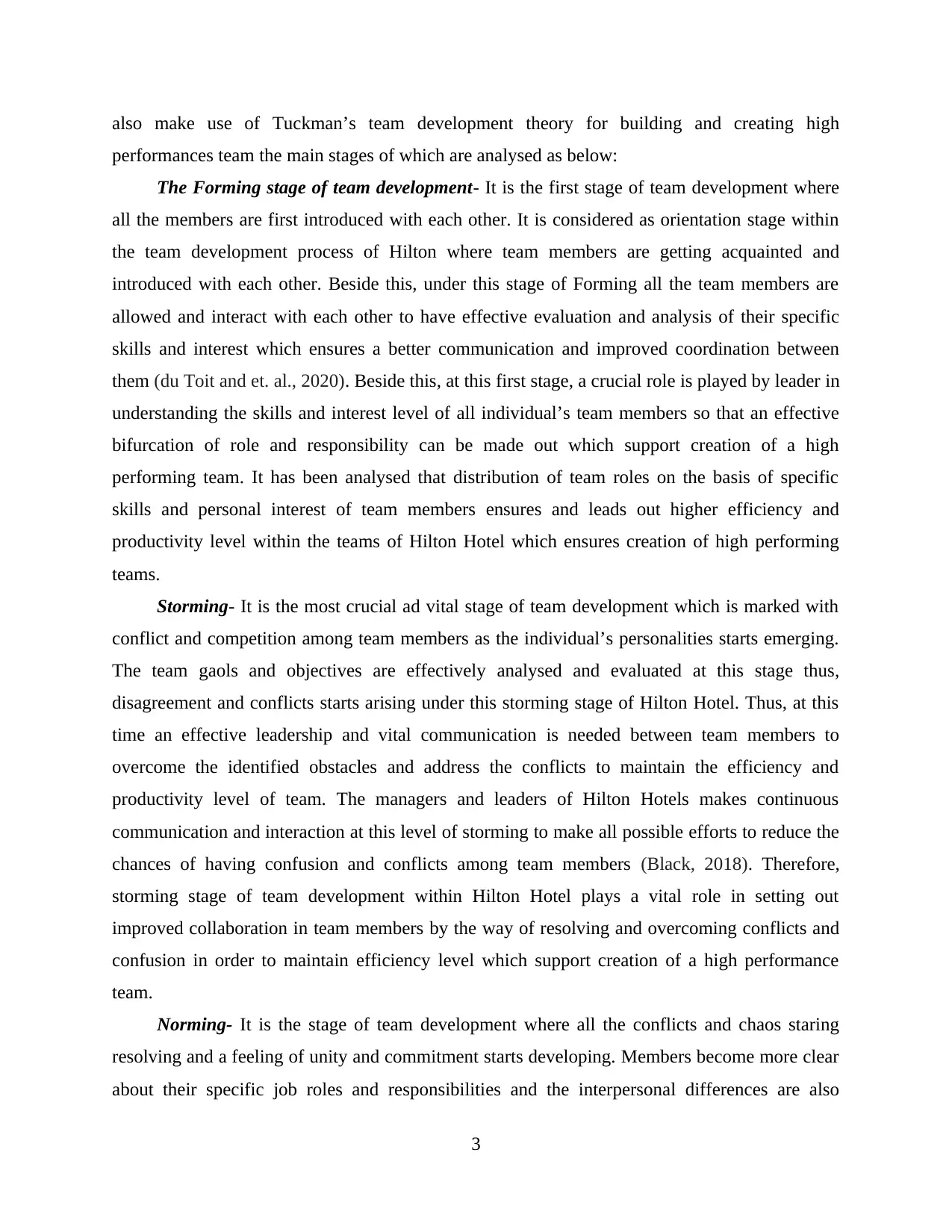
also make use of Tuckman’s team development theory for building and creating high
performances team the main stages of which are analysed as below:
The Forming stage of team development- It is the first stage of team development where
all the members are first introduced with each other. It is considered as orientation stage within
the team development process of Hilton where team members are getting acquainted and
introduced with each other. Beside this, under this stage of Forming all the team members are
allowed and interact with each other to have effective evaluation and analysis of their specific
skills and interest which ensures a better communication and improved coordination between
them (du Toit and et. al., 2020). Beside this, at this first stage, a crucial role is played by leader in
understanding the skills and interest level of all individual’s team members so that an effective
bifurcation of role and responsibility can be made out which support creation of a high
performing team. It has been analysed that distribution of team roles on the basis of specific
skills and personal interest of team members ensures and leads out higher efficiency and
productivity level within the teams of Hilton Hotel which ensures creation of high performing
teams.
Storming- It is the most crucial ad vital stage of team development which is marked with
conflict and competition among team members as the individual’s personalities starts emerging.
The team gaols and objectives are effectively analysed and evaluated at this stage thus,
disagreement and conflicts starts arising under this storming stage of Hilton Hotel. Thus, at this
time an effective leadership and vital communication is needed between team members to
overcome the identified obstacles and address the conflicts to maintain the efficiency and
productivity level of team. The managers and leaders of Hilton Hotels makes continuous
communication and interaction at this level of storming to make all possible efforts to reduce the
chances of having confusion and conflicts among team members (Black, 2018). Therefore,
storming stage of team development within Hilton Hotel plays a vital role in setting out
improved collaboration in team members by the way of resolving and overcoming conflicts and
confusion in order to maintain efficiency level which support creation of a high performance
team.
Norming- It is the stage of team development where all the conflicts and chaos staring
resolving and a feeling of unity and commitment starts developing. Members become more clear
about their specific job roles and responsibilities and the interpersonal differences are also
3
performances team the main stages of which are analysed as below:
The Forming stage of team development- It is the first stage of team development where
all the members are first introduced with each other. It is considered as orientation stage within
the team development process of Hilton where team members are getting acquainted and
introduced with each other. Beside this, under this stage of Forming all the team members are
allowed and interact with each other to have effective evaluation and analysis of their specific
skills and interest which ensures a better communication and improved coordination between
them (du Toit and et. al., 2020). Beside this, at this first stage, a crucial role is played by leader in
understanding the skills and interest level of all individual’s team members so that an effective
bifurcation of role and responsibility can be made out which support creation of a high
performing team. It has been analysed that distribution of team roles on the basis of specific
skills and personal interest of team members ensures and leads out higher efficiency and
productivity level within the teams of Hilton Hotel which ensures creation of high performing
teams.
Storming- It is the most crucial ad vital stage of team development which is marked with
conflict and competition among team members as the individual’s personalities starts emerging.
The team gaols and objectives are effectively analysed and evaluated at this stage thus,
disagreement and conflicts starts arising under this storming stage of Hilton Hotel. Thus, at this
time an effective leadership and vital communication is needed between team members to
overcome the identified obstacles and address the conflicts to maintain the efficiency and
productivity level of team. The managers and leaders of Hilton Hotels makes continuous
communication and interaction at this level of storming to make all possible efforts to reduce the
chances of having confusion and conflicts among team members (Black, 2018). Therefore,
storming stage of team development within Hilton Hotel plays a vital role in setting out
improved collaboration in team members by the way of resolving and overcoming conflicts and
confusion in order to maintain efficiency level which support creation of a high performance
team.
Norming- It is the stage of team development where all the conflicts and chaos staring
resolving and a feeling of unity and commitment starts developing. Members become more clear
about their specific job roles and responsibilities and the interpersonal differences are also
3
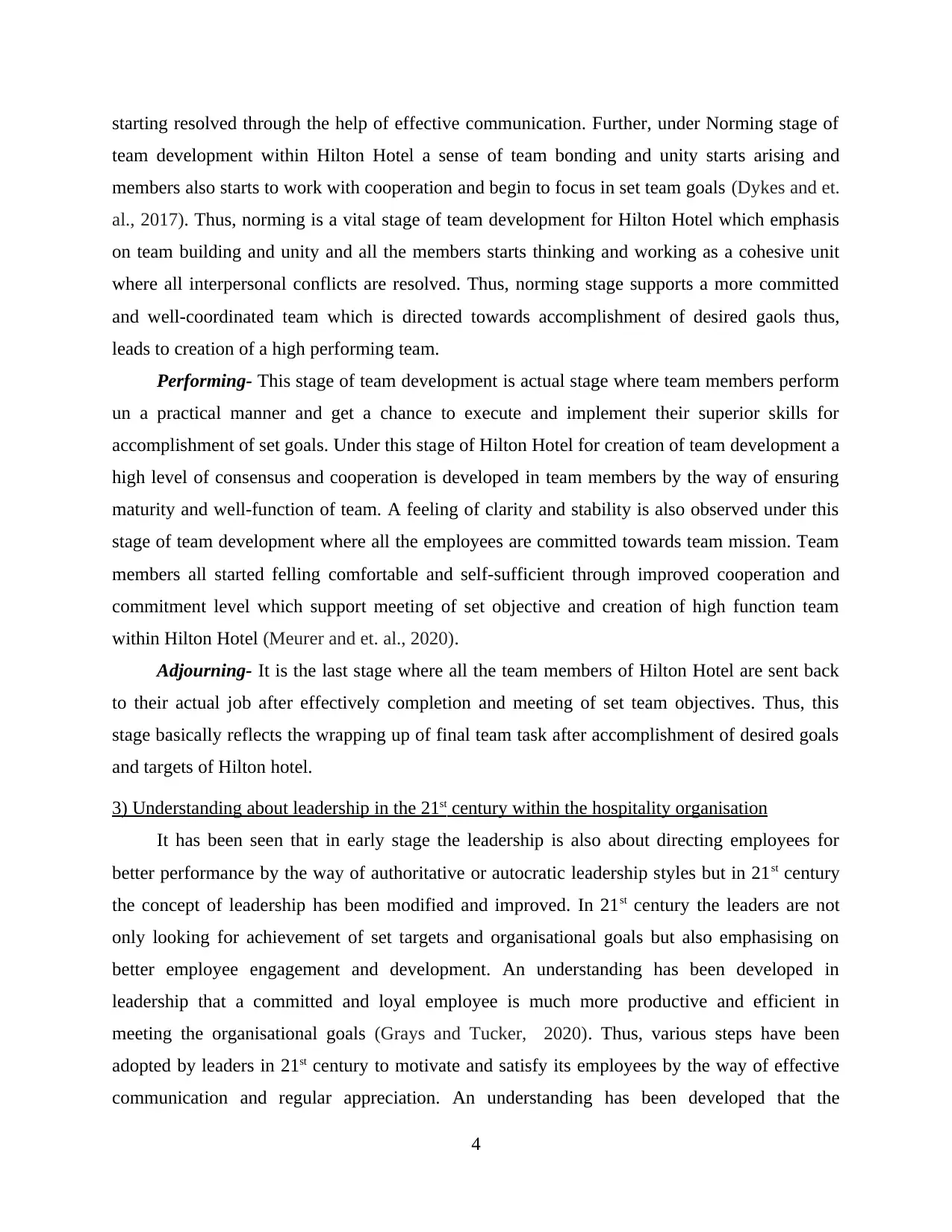
starting resolved through the help of effective communication. Further, under Norming stage of
team development within Hilton Hotel a sense of team bonding and unity starts arising and
members also starts to work with cooperation and begin to focus in set team goals (Dykes and et.
al., 2017). Thus, norming is a vital stage of team development for Hilton Hotel which emphasis
on team building and unity and all the members starts thinking and working as a cohesive unit
where all interpersonal conflicts are resolved. Thus, norming stage supports a more committed
and well-coordinated team which is directed towards accomplishment of desired gaols thus,
leads to creation of a high performing team.
Performing- This stage of team development is actual stage where team members perform
un a practical manner and get a chance to execute and implement their superior skills for
accomplishment of set goals. Under this stage of Hilton Hotel for creation of team development a
high level of consensus and cooperation is developed in team members by the way of ensuring
maturity and well-function of team. A feeling of clarity and stability is also observed under this
stage of team development where all the employees are committed towards team mission. Team
members all started felling comfortable and self-sufficient through improved cooperation and
commitment level which support meeting of set objective and creation of high function team
within Hilton Hotel (Meurer and et. al., 2020).
Adjourning- It is the last stage where all the team members of Hilton Hotel are sent back
to their actual job after effectively completion and meeting of set team objectives. Thus, this
stage basically reflects the wrapping up of final team task after accomplishment of desired goals
and targets of Hilton hotel.
3) Understanding about leadership in the 21st century within the hospitality organisation
It has been seen that in early stage the leadership is also about directing employees for
better performance by the way of authoritative or autocratic leadership styles but in 21st century
the concept of leadership has been modified and improved. In 21st century the leaders are not
only looking for achievement of set targets and organisational goals but also emphasising on
better employee engagement and development. An understanding has been developed in
leadership that a committed and loyal employee is much more productive and efficient in
meeting the organisational goals (Grays and Tucker, 2020). Thus, various steps have been
adopted by leaders in 21st century to motivate and satisfy its employees by the way of effective
communication and regular appreciation. An understanding has been developed that the
4
team development within Hilton Hotel a sense of team bonding and unity starts arising and
members also starts to work with cooperation and begin to focus in set team goals (Dykes and et.
al., 2017). Thus, norming is a vital stage of team development for Hilton Hotel which emphasis
on team building and unity and all the members starts thinking and working as a cohesive unit
where all interpersonal conflicts are resolved. Thus, norming stage supports a more committed
and well-coordinated team which is directed towards accomplishment of desired gaols thus,
leads to creation of a high performing team.
Performing- This stage of team development is actual stage where team members perform
un a practical manner and get a chance to execute and implement their superior skills for
accomplishment of set goals. Under this stage of Hilton Hotel for creation of team development a
high level of consensus and cooperation is developed in team members by the way of ensuring
maturity and well-function of team. A feeling of clarity and stability is also observed under this
stage of team development where all the employees are committed towards team mission. Team
members all started felling comfortable and self-sufficient through improved cooperation and
commitment level which support meeting of set objective and creation of high function team
within Hilton Hotel (Meurer and et. al., 2020).
Adjourning- It is the last stage where all the team members of Hilton Hotel are sent back
to their actual job after effectively completion and meeting of set team objectives. Thus, this
stage basically reflects the wrapping up of final team task after accomplishment of desired goals
and targets of Hilton hotel.
3) Understanding about leadership in the 21st century within the hospitality organisation
It has been seen that in early stage the leadership is also about directing employees for
better performance by the way of authoritative or autocratic leadership styles but in 21st century
the concept of leadership has been modified and improved. In 21st century the leaders are not
only looking for achievement of set targets and organisational goals but also emphasising on
better employee engagement and development. An understanding has been developed in
leadership that a committed and loyal employee is much more productive and efficient in
meeting the organisational goals (Grays and Tucker, 2020). Thus, various steps have been
adopted by leaders in 21st century to motivate and satisfy its employees by the way of effective
communication and regular appreciation. An understanding has been developed that the
4
⊘ This is a preview!⊘
Do you want full access?
Subscribe today to unlock all pages.

Trusted by 1+ million students worldwide
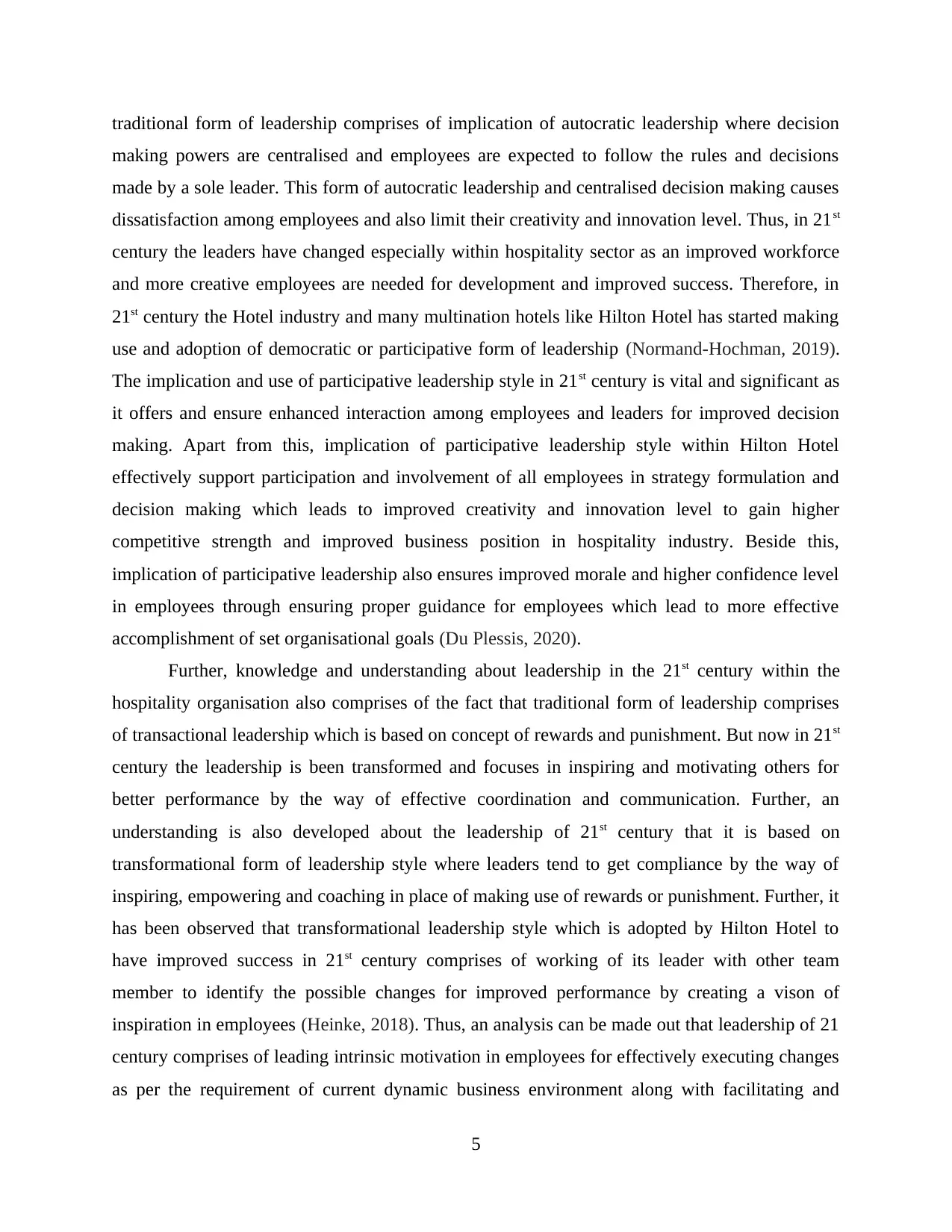
traditional form of leadership comprises of implication of autocratic leadership where decision
making powers are centralised and employees are expected to follow the rules and decisions
made by a sole leader. This form of autocratic leadership and centralised decision making causes
dissatisfaction among employees and also limit their creativity and innovation level. Thus, in 21st
century the leaders have changed especially within hospitality sector as an improved workforce
and more creative employees are needed for development and improved success. Therefore, in
21st century the Hotel industry and many multination hotels like Hilton Hotel has started making
use and adoption of democratic or participative form of leadership (Normand-Hochman, 2019).
The implication and use of participative leadership style in 21st century is vital and significant as
it offers and ensure enhanced interaction among employees and leaders for improved decision
making. Apart from this, implication of participative leadership style within Hilton Hotel
effectively support participation and involvement of all employees in strategy formulation and
decision making which leads to improved creativity and innovation level to gain higher
competitive strength and improved business position in hospitality industry. Beside this,
implication of participative leadership also ensures improved morale and higher confidence level
in employees through ensuring proper guidance for employees which lead to more effective
accomplishment of set organisational goals (Du Plessis, 2020).
Further, knowledge and understanding about leadership in the 21st century within the
hospitality organisation also comprises of the fact that traditional form of leadership comprises
of transactional leadership which is based on concept of rewards and punishment. But now in 21st
century the leadership is been transformed and focuses in inspiring and motivating others for
better performance by the way of effective coordination and communication. Further, an
understanding is also developed about the leadership of 21st century that it is based on
transformational form of leadership style where leaders tend to get compliance by the way of
inspiring, empowering and coaching in place of making use of rewards or punishment. Further, it
has been observed that transformational leadership style which is adopted by Hilton Hotel to
have improved success in 21st century comprises of working of its leader with other team
member to identify the possible changes for improved performance by creating a vison of
inspiration in employees (Heinke, 2018). Thus, an analysis can be made out that leadership of 21
century comprises of leading intrinsic motivation in employees for effectively executing changes
as per the requirement of current dynamic business environment along with facilitating and
5
making powers are centralised and employees are expected to follow the rules and decisions
made by a sole leader. This form of autocratic leadership and centralised decision making causes
dissatisfaction among employees and also limit their creativity and innovation level. Thus, in 21st
century the leaders have changed especially within hospitality sector as an improved workforce
and more creative employees are needed for development and improved success. Therefore, in
21st century the Hotel industry and many multination hotels like Hilton Hotel has started making
use and adoption of democratic or participative form of leadership (Normand-Hochman, 2019).
The implication and use of participative leadership style in 21st century is vital and significant as
it offers and ensure enhanced interaction among employees and leaders for improved decision
making. Apart from this, implication of participative leadership style within Hilton Hotel
effectively support participation and involvement of all employees in strategy formulation and
decision making which leads to improved creativity and innovation level to gain higher
competitive strength and improved business position in hospitality industry. Beside this,
implication of participative leadership also ensures improved morale and higher confidence level
in employees through ensuring proper guidance for employees which lead to more effective
accomplishment of set organisational goals (Du Plessis, 2020).
Further, knowledge and understanding about leadership in the 21st century within the
hospitality organisation also comprises of the fact that traditional form of leadership comprises
of transactional leadership which is based on concept of rewards and punishment. But now in 21st
century the leadership is been transformed and focuses in inspiring and motivating others for
better performance by the way of effective coordination and communication. Further, an
understanding is also developed about the leadership of 21st century that it is based on
transformational form of leadership style where leaders tend to get compliance by the way of
inspiring, empowering and coaching in place of making use of rewards or punishment. Further, it
has been observed that transformational leadership style which is adopted by Hilton Hotel to
have improved success in 21st century comprises of working of its leader with other team
member to identify the possible changes for improved performance by creating a vison of
inspiration in employees (Heinke, 2018). Thus, an analysis can be made out that leadership of 21
century comprises of leading intrinsic motivation in employees for effectively executing changes
as per the requirement of current dynamic business environment along with facilitating and
5
Paraphrase This Document
Need a fresh take? Get an instant paraphrase of this document with our AI Paraphraser
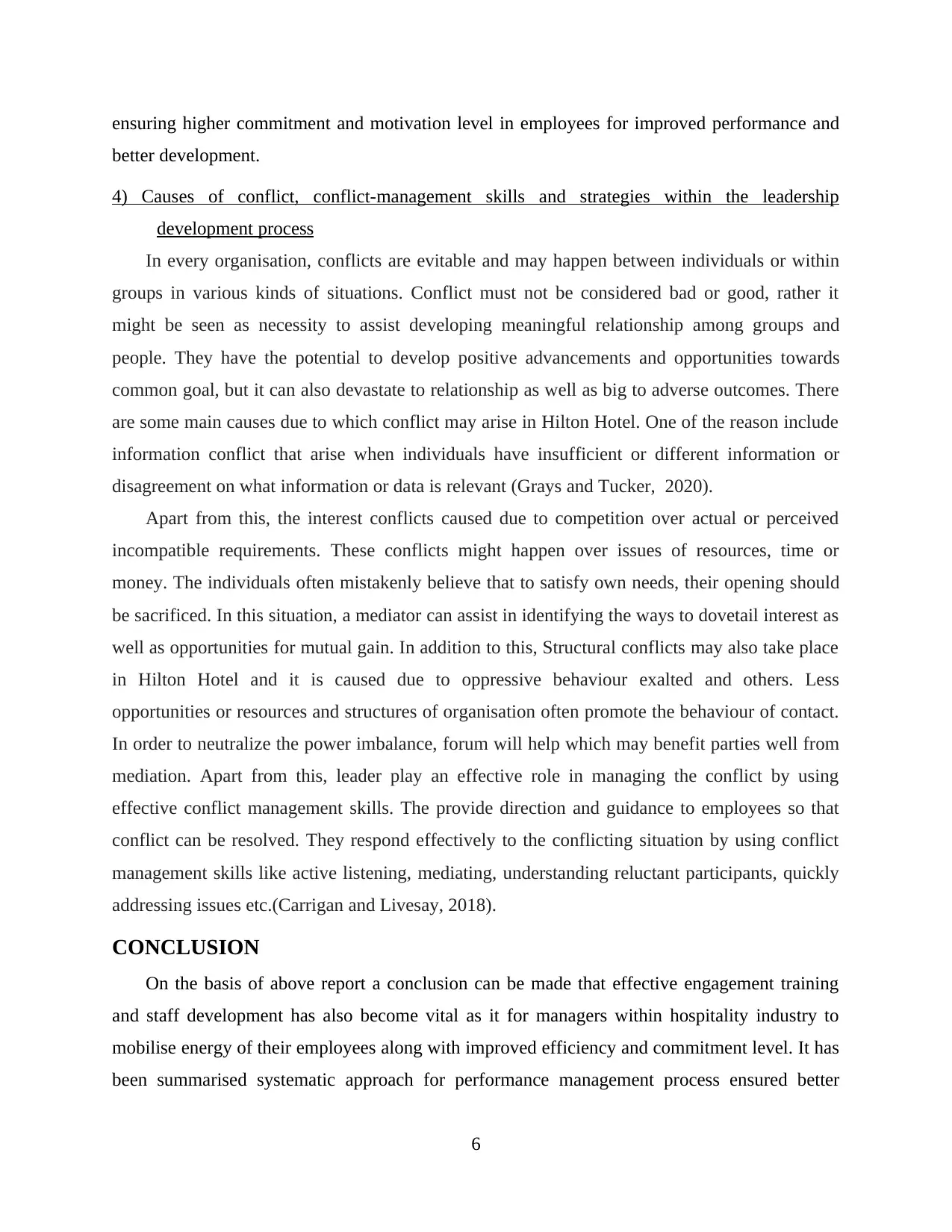
ensuring higher commitment and motivation level in employees for improved performance and
better development.
4) Causes of conflict, conflict-management skills and strategies within the leadership
development process
In every organisation, conflicts are evitable and may happen between individuals or within
groups in various kinds of situations. Conflict must not be considered bad or good, rather it
might be seen as necessity to assist developing meaningful relationship among groups and
people. They have the potential to develop positive advancements and opportunities towards
common goal, but it can also devastate to relationship as well as big to adverse outcomes. There
are some main causes due to which conflict may arise in Hilton Hotel. One of the reason include
information conflict that arise when individuals have insufficient or different information or
disagreement on what information or data is relevant (Grays and Tucker, 2020).
Apart from this, the interest conflicts caused due to competition over actual or perceived
incompatible requirements. These conflicts might happen over issues of resources, time or
money. The individuals often mistakenly believe that to satisfy own needs, their opening should
be sacrificed. In this situation, a mediator can assist in identifying the ways to dovetail interest as
well as opportunities for mutual gain. In addition to this, Structural conflicts may also take place
in Hilton Hotel and it is caused due to oppressive behaviour exalted and others. Less
opportunities or resources and structures of organisation often promote the behaviour of contact.
In order to neutralize the power imbalance, forum will help which may benefit parties well from
mediation. Apart from this, leader play an effective role in managing the conflict by using
effective conflict management skills. The provide direction and guidance to employees so that
conflict can be resolved. They respond effectively to the conflicting situation by using conflict
management skills like active listening, mediating, understanding reluctant participants, quickly
addressing issues etc.(Carrigan and Livesay, 2018).
CONCLUSION
On the basis of above report a conclusion can be made that effective engagement training
and staff development has also become vital as it for managers within hospitality industry to
mobilise energy of their employees along with improved efficiency and commitment level. It has
been summarised systematic approach for performance management process ensured better
6
better development.
4) Causes of conflict, conflict-management skills and strategies within the leadership
development process
In every organisation, conflicts are evitable and may happen between individuals or within
groups in various kinds of situations. Conflict must not be considered bad or good, rather it
might be seen as necessity to assist developing meaningful relationship among groups and
people. They have the potential to develop positive advancements and opportunities towards
common goal, but it can also devastate to relationship as well as big to adverse outcomes. There
are some main causes due to which conflict may arise in Hilton Hotel. One of the reason include
information conflict that arise when individuals have insufficient or different information or
disagreement on what information or data is relevant (Grays and Tucker, 2020).
Apart from this, the interest conflicts caused due to competition over actual or perceived
incompatible requirements. These conflicts might happen over issues of resources, time or
money. The individuals often mistakenly believe that to satisfy own needs, their opening should
be sacrificed. In this situation, a mediator can assist in identifying the ways to dovetail interest as
well as opportunities for mutual gain. In addition to this, Structural conflicts may also take place
in Hilton Hotel and it is caused due to oppressive behaviour exalted and others. Less
opportunities or resources and structures of organisation often promote the behaviour of contact.
In order to neutralize the power imbalance, forum will help which may benefit parties well from
mediation. Apart from this, leader play an effective role in managing the conflict by using
effective conflict management skills. The provide direction and guidance to employees so that
conflict can be resolved. They respond effectively to the conflicting situation by using conflict
management skills like active listening, mediating, understanding reluctant participants, quickly
addressing issues etc.(Carrigan and Livesay, 2018).
CONCLUSION
On the basis of above report a conclusion can be made that effective engagement training
and staff development has also become vital as it for managers within hospitality industry to
mobilise energy of their employees along with improved efficiency and commitment level. It has
been summarised systematic approach for performance management process ensured better
6
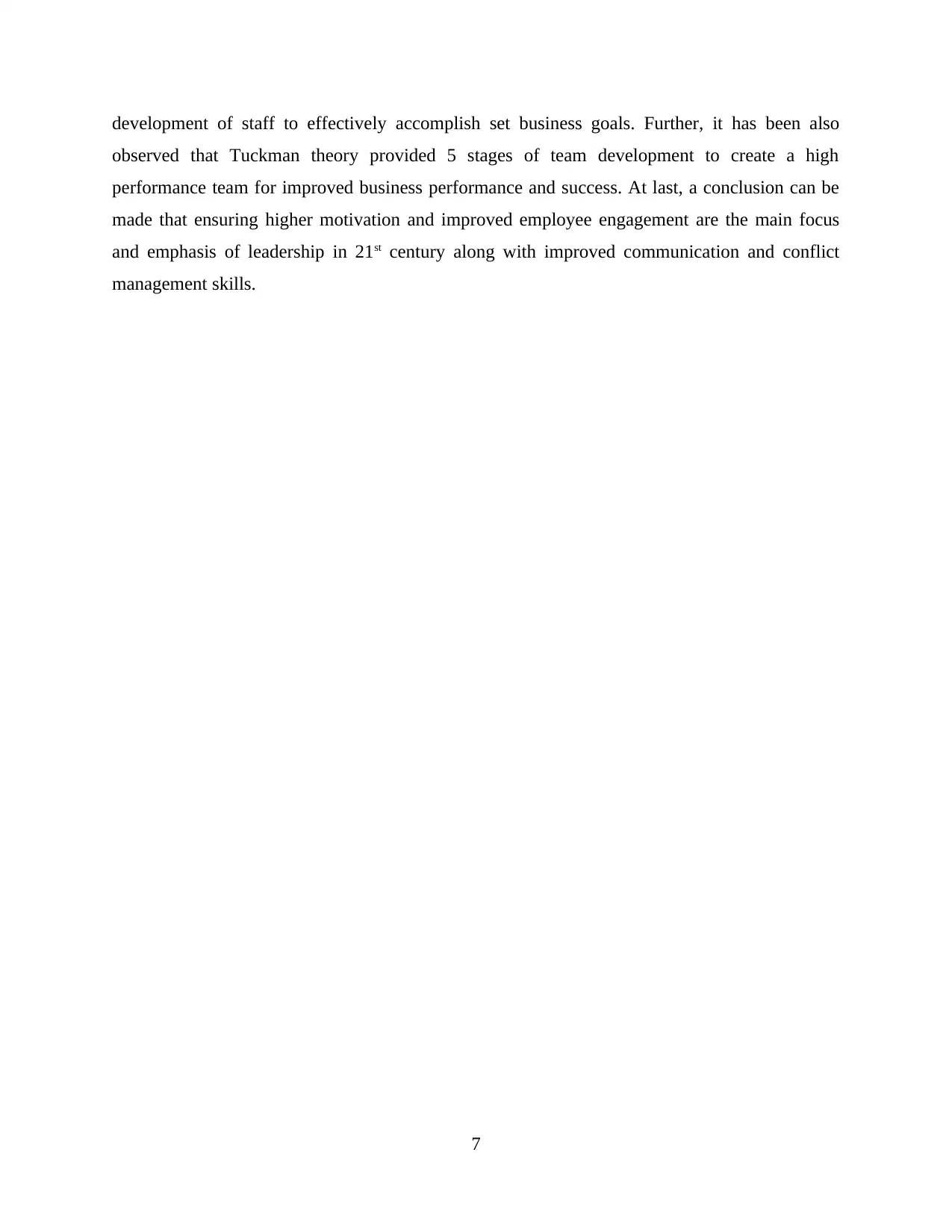
development of staff to effectively accomplish set business goals. Further, it has been also
observed that Tuckman theory provided 5 stages of team development to create a high
performance team for improved business performance and success. At last, a conclusion can be
made that ensuring higher motivation and improved employee engagement are the main focus
and emphasis of leadership in 21st century along with improved communication and conflict
management skills.
7
observed that Tuckman theory provided 5 stages of team development to create a high
performance team for improved business performance and success. At last, a conclusion can be
made that ensuring higher motivation and improved employee engagement are the main focus
and emphasis of leadership in 21st century along with improved communication and conflict
management skills.
7
⊘ This is a preview!⊘
Do you want full access?
Subscribe today to unlock all pages.

Trusted by 1+ million students worldwide

8
Paraphrase This Document
Need a fresh take? Get an instant paraphrase of this document with our AI Paraphraser
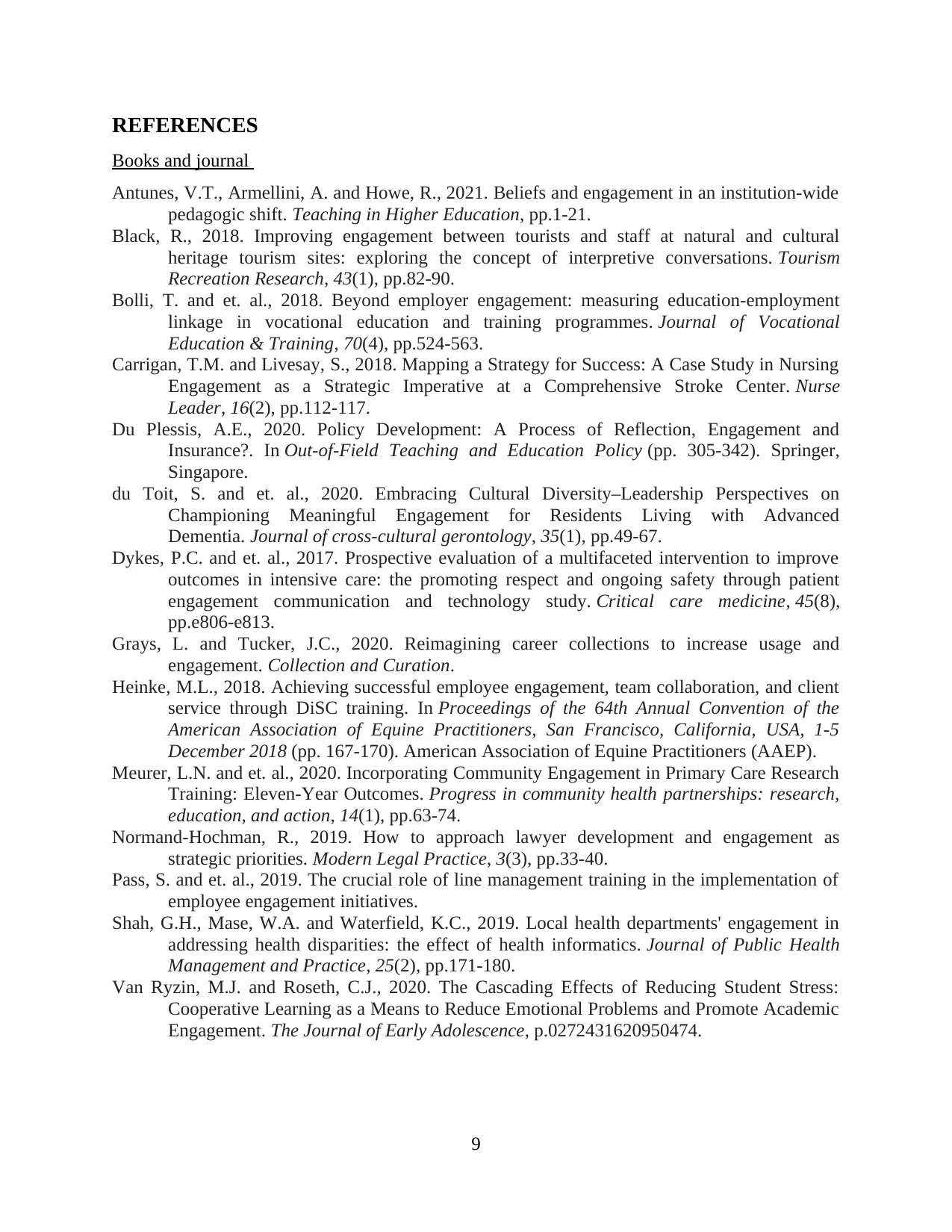
REFERENCES
Books and journal
Antunes, V.T., Armellini, A. and Howe, R., 2021. Beliefs and engagement in an institution-wide
pedagogic shift. Teaching in Higher Education, pp.1-21.
Black, R., 2018. Improving engagement between tourists and staff at natural and cultural
heritage tourism sites: exploring the concept of interpretive conversations. Tourism
Recreation Research, 43(1), pp.82-90.
Bolli, T. and et. al., 2018. Beyond employer engagement: measuring education-employment
linkage in vocational education and training programmes. Journal of Vocational
Education & Training, 70(4), pp.524-563.
Carrigan, T.M. and Livesay, S., 2018. Mapping a Strategy for Success: A Case Study in Nursing
Engagement as a Strategic Imperative at a Comprehensive Stroke Center. Nurse
Leader, 16(2), pp.112-117.
Du Plessis, A.E., 2020. Policy Development: A Process of Reflection, Engagement and
Insurance?. In Out-of-Field Teaching and Education Policy (pp. 305-342). Springer,
Singapore.
du Toit, S. and et. al., 2020. Embracing Cultural Diversity–Leadership Perspectives on
Championing Meaningful Engagement for Residents Living with Advanced
Dementia. Journal of cross-cultural gerontology, 35(1), pp.49-67.
Dykes, P.C. and et. al., 2017. Prospective evaluation of a multifaceted intervention to improve
outcomes in intensive care: the promoting respect and ongoing safety through patient
engagement communication and technology study. Critical care medicine, 45(8),
pp.e806-e813.
Grays, L. and Tucker, J.C., 2020. Reimagining career collections to increase usage and
engagement. Collection and Curation.
Heinke, M.L., 2018. Achieving successful employee engagement, team collaboration, and client
service through DiSC training. In Proceedings of the 64th Annual Convention of the
American Association of Equine Practitioners, San Francisco, California, USA, 1-5
December 2018 (pp. 167-170). American Association of Equine Practitioners (AAEP).
Meurer, L.N. and et. al., 2020. Incorporating Community Engagement in Primary Care Research
Training: Eleven-Year Outcomes. Progress in community health partnerships: research,
education, and action, 14(1), pp.63-74.
Normand-Hochman, R., 2019. How to approach lawyer development and engagement as
strategic priorities. Modern Legal Practice, 3(3), pp.33-40.
Pass, S. and et. al., 2019. The crucial role of line management training in the implementation of
employee engagement initiatives.
Shah, G.H., Mase, W.A. and Waterfield, K.C., 2019. Local health departments' engagement in
addressing health disparities: the effect of health informatics. Journal of Public Health
Management and Practice, 25(2), pp.171-180.
Van Ryzin, M.J. and Roseth, C.J., 2020. The Cascading Effects of Reducing Student Stress:
Cooperative Learning as a Means to Reduce Emotional Problems and Promote Academic
Engagement. The Journal of Early Adolescence, p.0272431620950474.
9
Books and journal
Antunes, V.T., Armellini, A. and Howe, R., 2021. Beliefs and engagement in an institution-wide
pedagogic shift. Teaching in Higher Education, pp.1-21.
Black, R., 2018. Improving engagement between tourists and staff at natural and cultural
heritage tourism sites: exploring the concept of interpretive conversations. Tourism
Recreation Research, 43(1), pp.82-90.
Bolli, T. and et. al., 2018. Beyond employer engagement: measuring education-employment
linkage in vocational education and training programmes. Journal of Vocational
Education & Training, 70(4), pp.524-563.
Carrigan, T.M. and Livesay, S., 2018. Mapping a Strategy for Success: A Case Study in Nursing
Engagement as a Strategic Imperative at a Comprehensive Stroke Center. Nurse
Leader, 16(2), pp.112-117.
Du Plessis, A.E., 2020. Policy Development: A Process of Reflection, Engagement and
Insurance?. In Out-of-Field Teaching and Education Policy (pp. 305-342). Springer,
Singapore.
du Toit, S. and et. al., 2020. Embracing Cultural Diversity–Leadership Perspectives on
Championing Meaningful Engagement for Residents Living with Advanced
Dementia. Journal of cross-cultural gerontology, 35(1), pp.49-67.
Dykes, P.C. and et. al., 2017. Prospective evaluation of a multifaceted intervention to improve
outcomes in intensive care: the promoting respect and ongoing safety through patient
engagement communication and technology study. Critical care medicine, 45(8),
pp.e806-e813.
Grays, L. and Tucker, J.C., 2020. Reimagining career collections to increase usage and
engagement. Collection and Curation.
Heinke, M.L., 2018. Achieving successful employee engagement, team collaboration, and client
service through DiSC training. In Proceedings of the 64th Annual Convention of the
American Association of Equine Practitioners, San Francisco, California, USA, 1-5
December 2018 (pp. 167-170). American Association of Equine Practitioners (AAEP).
Meurer, L.N. and et. al., 2020. Incorporating Community Engagement in Primary Care Research
Training: Eleven-Year Outcomes. Progress in community health partnerships: research,
education, and action, 14(1), pp.63-74.
Normand-Hochman, R., 2019. How to approach lawyer development and engagement as
strategic priorities. Modern Legal Practice, 3(3), pp.33-40.
Pass, S. and et. al., 2019. The crucial role of line management training in the implementation of
employee engagement initiatives.
Shah, G.H., Mase, W.A. and Waterfield, K.C., 2019. Local health departments' engagement in
addressing health disparities: the effect of health informatics. Journal of Public Health
Management and Practice, 25(2), pp.171-180.
Van Ryzin, M.J. and Roseth, C.J., 2020. The Cascading Effects of Reducing Student Stress:
Cooperative Learning as a Means to Reduce Emotional Problems and Promote Academic
Engagement. The Journal of Early Adolescence, p.0272431620950474.
9
1 out of 11
Related Documents
Your All-in-One AI-Powered Toolkit for Academic Success.
+13062052269
info@desklib.com
Available 24*7 on WhatsApp / Email
![[object Object]](/_next/static/media/star-bottom.7253800d.svg)
Unlock your academic potential
Copyright © 2020–2026 A2Z Services. All Rights Reserved. Developed and managed by ZUCOL.





